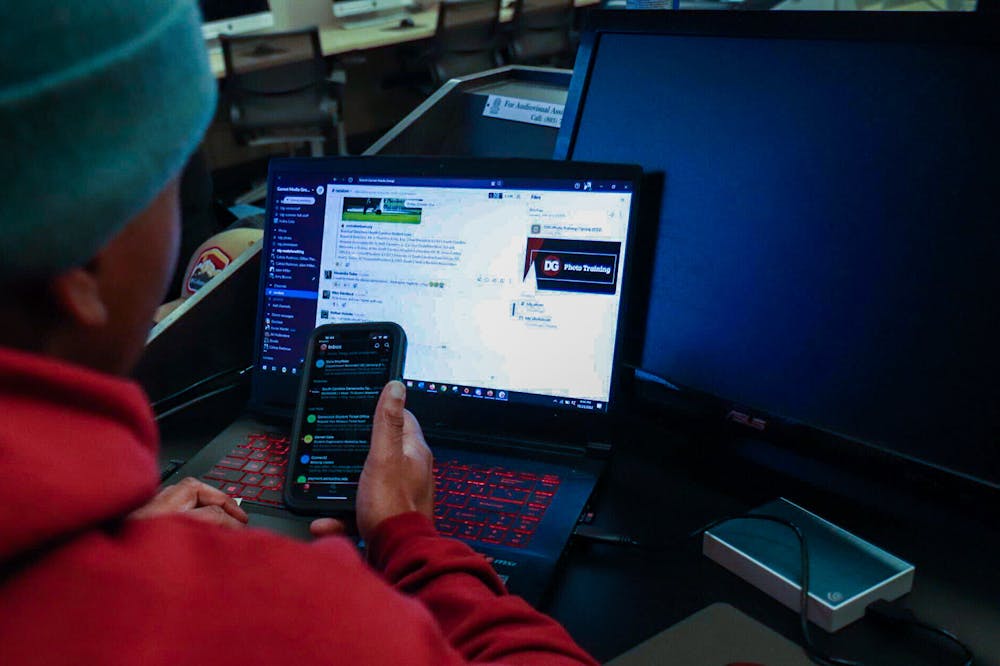In today's classrooms, digital communication such as email is the preferred choice of students when communicating with professors. However, students who exclusively use this form of communication are at risk of not honing their socialization skills.
Habitual use of technology when communicating with professors could put students at risk of not developing professional social skills.
"I absolutely see an over-reliance on email in my students, especially at the undergraduate level; if students just send an email with a one-sentence question then they're missing all of that context and examples I could offer that happens so rapidly with verbal communication." Shannon Bowen, a professor at the School of Journalism and Mass Communication, said.
Some students don’t take the time to craft relationships with professors or don't want to extend themselves past going to class, making it difficult to gain the necessary experience and practice for communicating professionally. Ki'Ausha Brisco, an undecided first-year student, said she hasn't been able to develop any type of relationship with a professor besides surface level thus far.
“I’m too shy," Brisco said. "(My professors) don’t really extend themselves. I don’t even know their names.”
Attending professors’ office hours is a great way to start a conversation with your instructors and practice communication skills by expressing interest in the career field or clearing up any miscommunication about the material.
Kris McQueen, a graduate student, recognizes the benefit of speaking face-to-face with professors.
“Usually if I have to talk to my professors I prefer to go straight to their office or talk to them directly after class," McQueen said. "A lot of things can get lost in translation with email and they can get lost in the pile. Talking in person with your professor helps, you can avoid the risk of typos and I can take social cues to communicate more clearly.”
Going to your professor to talk can not only prevent misunderstanding, but it can also allow you to get more in-depth information on the classwork you need help with. Professors can also explain things differently or go slower so that you understand the information more clearly.
"You can get a lot of context on what's been discussed in the class ... and more detail on assignments or exams," Bowen said. "(Office hours) are a better way to ask your professors questions because you can have a discussion, they can elaborate on concepts and offer examples."
Despite these benefits, studies show students are not taking advantage of this opportunity as much as they should. In a survey done by College Pulse of 2,000 undergraduates, 28% said they never visit professors during office hours, and 40% said they only visit once or twice a semester.
Mikenzie Turner, a fourth-year mass communications student, is one of the few students who makes use of her professors' office hours regularly.
"I get more of a personal connection when it comes to my teachers," Turner said. "It's definitely faster and better than talking over email."
Even if it feels awkward at first, professors are usually appreciative that students take the time to meet outside of class. Going to office hours shows that a student is taking the initiative to further their learning by taking the time to speak to them instead of sending a brief email.
Taking advantage of these office hours can help you exercise your ability to effectively express or clarify any concerns or problems you may have, which is useful in the workplace.
The ability to effectively communicate in the workplace is considered a “soft skill." Soft skills are qualities that a person can develop through their experiences and are transferrable from job to job, such as collaboration and critical thinking. Skills like these are important because they expand your ability to work with others and play a big role in advancing one’s career. If a student is lacking this ability coming out of college, they are at a significant disadvantage.
In 2018, Morning Consult conducted an interview survey composed of 650 employers and over 1,500 current and former students. The study found that 73% of employers said they had a difficult time finding college graduates with the soft skills that their company needed. Sixty-nine percent of employers said it was difficult to find applicants with "effective communication" skills, and 65% said it was challenging to find applicants with interpersonal skills.
As the study shows, companies are looking for candidates that can effectively communicate beyond a screen. Practicing these skills in school can set a student up for success once they begin their professional journey.
"The ability to ... use critical thinking to understand multiple sides of an issue and argue from many sides, not just one, is incredibly important," Bowen said. "And if you have students who can’t engage in that type of behavior, I'm afraid their job prospects are going to be quite limited."
Acquiring these abilities means students need to rely less on technological communication and practice their soft skills to become better in-person communicators. In order to exercise this skill, students must stop exclusively using digital communication and instead meet up with others face-to-face.

